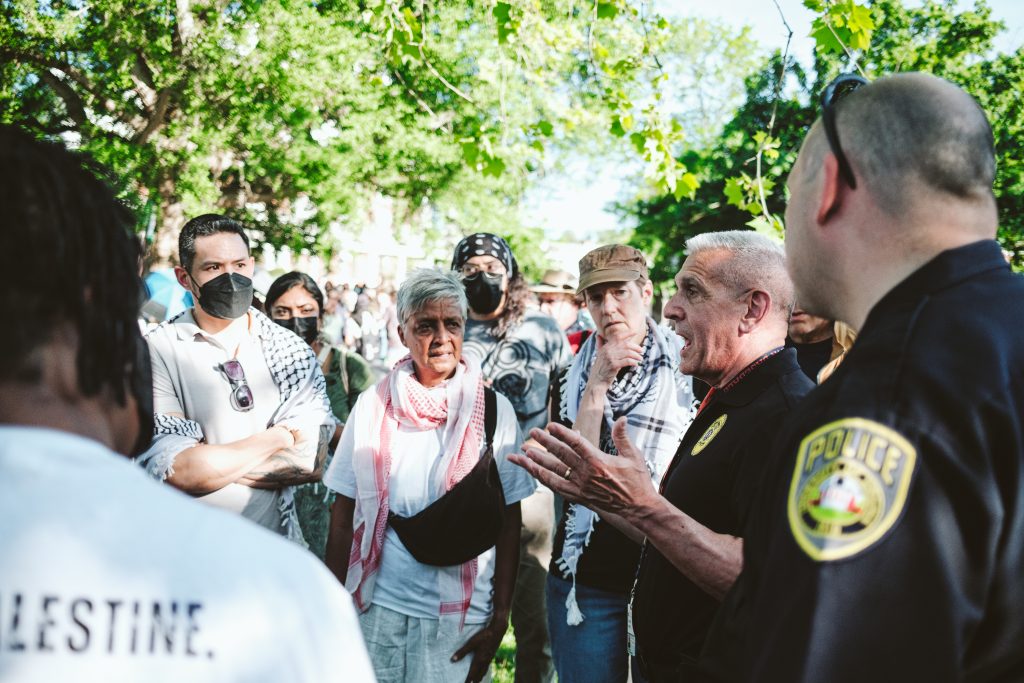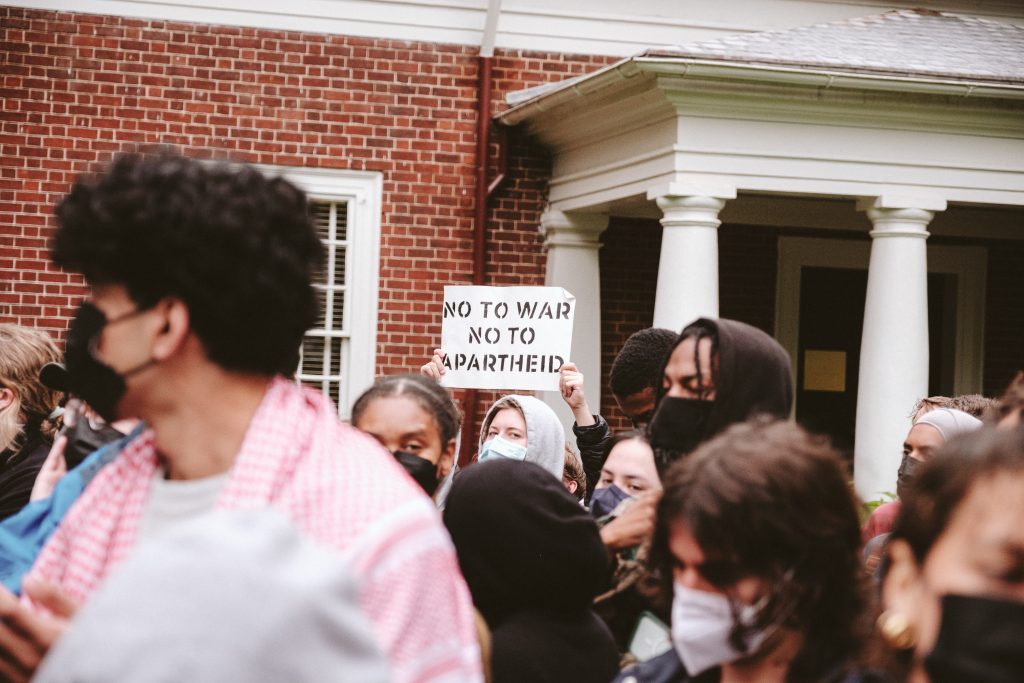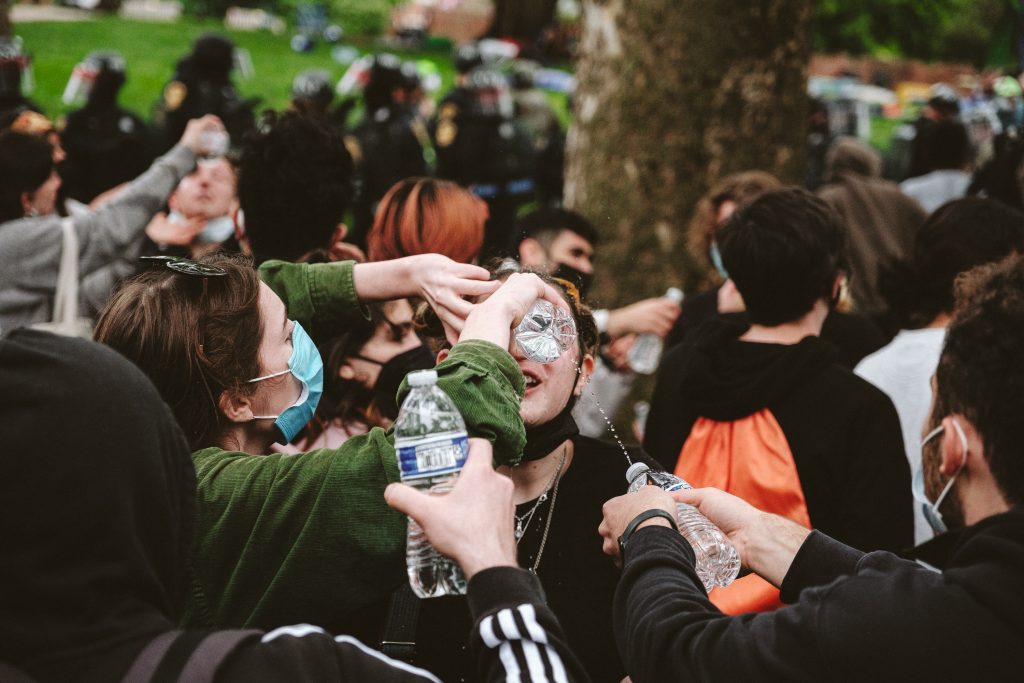Administrators, faculty, students, and the broader Charlottesville community continue to grapple with the forceful removal of a pro-Palestine encampment from the University of Virginia by police on Saturday, May 4. No one can agree on exactly what happened.
University leadership, including President Jim Ryan and University Police Chief Tim Longo, outlined the timeline of events from their perspective at a virtual town hall on Tuesday, May 7.
“So I will start with the obvious,” said Ryan at the opening of the meeting. “Saturday was a terrible and terribly sad and upsetting day. I’m very sorry it got to that point.”
Though he acknowledged there were disagreements with the decision to dissolve the encampment and bring in state police, Ryan stood behind the choices made and outlined leaderships’ decision-making process.
In response to UVA’s event, faculty members organized their own within two days—billed as Eyewitness Perspectives: An Honest Town Hall—to provide clarity on the differing points of view, supplemented with photo and video evidence.
“By gathering eyewitness accounts from people who served in various capacities in the Liberated Zone, from observer to liaison to participant, we want to set the record straight on events as they unfolded,” said Professor Tessa Farmer at the opening of the Thursday, May 9, meeting.
Following the meetings, everyone—protesters, faculty, administration, and observers—are struggling with what comes next.
At press time, UVA has indicated that final exercises will proceed as planned. Leadership has repeatedly assured that freedom of speech is a priority on Grounds, and they will continue to engage student groups in conversations about the conflict in Gaza.
Points of contention
While the timeline of police presence on the scene is largely agreed upon, the details surrounding opportunities for
de-escalation, level of force, and resistance differ between UVA administration and faculty.
UVA SAID
- The decision to end the encampment was made for the safety of the community. Reasons cited include protesters calling for more people and resources on social media throughout the week. Emergency alerts were required by the Clery Act, but leadership acknowledged at the Faculty Senate meeting on Friday, May 10, that they brought more people to the scene.
PROTESTERS SAID
- Despite the calls for more attendees and supplies, the size of the encampment shrank throughout the week. More observers showed up on Saturday, May 4, after UVA issued multiple emergency alerts. Multiple attempts were made to contact leadership, including Ryan and Vice President and Provost Ian Baucom, throughout the morning and afternoon of May 4.
UVA SAID
- Protesters were unwilling to take down the tents on Saturday, May 4, and clearly understood UVA’s tent policies.
PROTESTERS SAID
- Early in the morning of Saturday, May 4, faculty liaisons reportedly notified administration of the exemption for recreational tents listed on the UVA Environmental Health and Safety website. Faculty also mentioned other students were simultaneously using similar tents by the volleyball courts on Grounds.
UVA SAID
- Law enforcement identified four men dressed in black, at least two of whom “were known to law enforcement personnel as participating in violent acts elsewhere in the commonwealth.”
PROTESTERS SAID
- No one at the faculty-led town hall indicated that they saw or were informed of the “four men dressed in black” at the encampment.
UVA SAID
- When he went to remove the tents, Longo said he became fearful given demonstrators’ use of umbrellas and protest chants.
PROTESTERS SAID
- Video shows Longo approaching the encampment. Protesters can be seen holding open umbrellas, several with their backs to officers, while reciting a call-and-response: “We have a duty to fight for Palestine. We have a duty to win. We must love each other and protect one another. We have nothing to lose but our chains.” After several rounds of chanting, during which neither Longo nor any other officer is seen approaching the encampment, UPD walked away from the protest.
UVA SAID
- UPD officers “were met with the use of umbrellas in an aggressive manner” when attempting to remove the tents and break up the demonstrators, precipitating the decision to involve Virginia State Police.
PROTESTERS SAID
- A video from the faculty town hall shows UPD officers attempting to physically take the umbrellas as protesters hide behind them. One person can be heard yelling “What the fuck?” repeatedly before the crowd repeats “UPD, KKK, IDF, they’re all the same.” Faculty allege officers approached multiple times to take the umbrellas, with the video showing the third encounter.
UVA SAID
- Some protesters resisted arrest or threatened police, with one attendee charged with assaulting an officer.
PROTESTERS SAID
- VSP encircled and closed in on the encampment, cutting off bystanders and liaisons. Video shows professors attempting to deescalate the situation by standing between officers and the encampment, repeating, “These are our students, on their campus” as armed law enforcement officers moved in. Faculty and protesters broadly dispute claims of violence by encampment participants.
UVA SAID
- Student protesters at the encampment would not engage directly with administration, instead acting through faculty liaisons, showing an unwillingness to hold conversations.
PROTESTERS SAID
- UVA administration has demonstrated a willingness to hold conversations about Palestine, but with no substantive action taken.
UVA SAID
- Longo claims people affected by chemical irritants deployed were given medical treatment on the scene, with no significant injuries occurring to protesters.
PROTESTERS SAID
- No eyewitnesses recall any organized medical treatment center on site. Any first aid provided was given by demonstrators, observers, or faculty.















